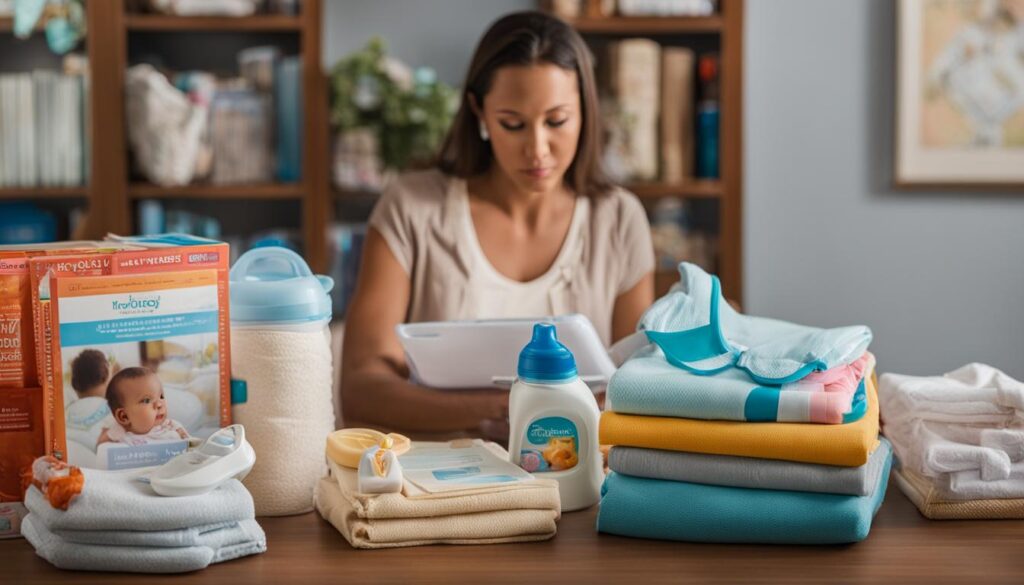As I hold my newborn, a wave of responsibility washes over me—why am I scared to take care of this tiny person? It’s a question that echoes in the minds of many new parents, wrapped in a swaddle of new parent anxiety and fear. Having a baby is supposed to be a time of immense joy, and it is, yet there’s another strand tangled in those rosy moments—coping with newborn care anxiety. How do I deal with the relentless worry that rattles my confidence, convincing me I’m not cut out for this? After all, overcoming fear of newborn responsibilities is a journey—one that requires patience, support, and self-kindness.
As I embark on this path, it’s clear that I’m not alone. It’s a shared experience, a common thread among countless others who’ve braved the steepest of learning curves to reassure any wobbling new parent—fear is often conquered not in the absence of challenges, but through persistence and courage amidst them.

Key Takeaways
- Accepting that fear is a natural part of the new parent experience can offer solace and solidarity.
- Recognizing the complexity of emotions in new parenthood helps in normalizing the anxiety felt.
- Seeking support from others can diminish the weight of newborn care anxiety.
- Education about newborn care can serve as a powerful tool in overcoming fear.
- Remembering that overcoming challenges builds resilience and invites growth on the parenting journey.
- Cultivating a patient and nurturing attitude towards oneself is as crucial as caring for the newborn.
Understanding the Roots of New Parent Anxiety and Fear
As I embrace the new chapter of my life as a parent, it’s hard to ignore the roller-coaster of emotions that have come along with it. Navigating the waters of parental anxiety and the fears of caring for a newborn has been as much a part of the journey as the late-night feedings and tender first smiles. Recognizing that my experiences are not isolated, I’ve learned that breaking down these emotions and facing the uncertainties can lead to a more assured path in parenthood.
The Reality of Postpartum Emotional Changes
The adjustment period after bringing a baby home is often painted with broad strokes of joy, but the finer lines are colored with the nuances of emotional shifts. These feelings are as natural as the postpartum recovery process itself, but acknowledgement is key in managing anxiety around newborn care. It is not just the birth of a baby, but also the birth of a parent, that takes place, and this transformative experience reshapes emotions in profound ways.
Common Fears of Caring for a Newborn
Every whimper and rustle in the night triggers a cascade of concerns. Am I doing this right? Is my baby sleeping safely? It’s these common fears of caring for a newborn that become the nightly whispers which we must comfort with knowledge and understanding, just as we soothe our infants back to sleep.
- Safety during sleep
- The fragility of the baby, especially concerning the fontanelle
- Managing the unpredictable infant sleep patterns
Identifying Symptoms of Postpartum Anxiety
As I grapple with the signs and symptoms of postpartum anxiety, it becomes essential to differentiate between fleeting worries and more substantial concerns that might require professional intervention. Note that symptoms can manifest both mentally and physically, creating a layer of complexity to the already challenging art of newborn care.
| Mental Symptoms | Physical Symptoms |
|---|---|
| Intensive worry about newborn’s safety | Restlessness |
| Heightened concerns about meeting baby’s needs | Rapid heartbeat |
| Fear of being alone with the baby | Shortness of breath |
Overcoming Fear of Taking Care of Newborn
As I step into the world of parenting, I’ve discovered a fear that many new parents share—the apprehension and trepidation of taking care of a newborn. The responsibility, the vigilance, and the worry that comes along with this tiny, dependent being is overwhelming. Yet, in recognizing this common barrier, I’ve learned overcoming fear of taking care of newborn begins with acknowledging and understanding the fears themselves.
It’s natural to worry about the potential harms that could occur to a newborn. Such fears can be all-encompassing, pervading through the silent night watches and the solitary feeding sessions—disrupting sleep and casting a shadow over the joys of childbirth. There is a term for this unrelenting dread, which is often referred to as newborn care phobia. This phobia can sometimes reflect deeper conditions, such as postpartum anxiety, which can cloak every thought with disaster and pump the heart with undue alarms.
Factors like hormonal changes, prior experiences with anxiety, or external stressors exacerbated by lack of sleep can trigger severe anxiety. It is important to differentiate these feelings from postpartum depression as they share many symptoms, yet require different approaches to care and recovery. When these daunting thoughts and feelings arise, gathering tips for dealing with fear of newborn care is an essential step toward restoration and peace of mind.
- Reach out to healthcare professionals early on for guidance and support.
- Communicate with other new parents who can relate to your experiences.
- Educate yourself on newborn care to enhance confidence in your abilities.
- Practicing mindfulness and relaxation techniques to ease mental strain.
In the quiet moments when doubts seep in, I remind myself that, like many before me, I can emerge past the grip of fear. It’s a journey of incremental learning, of transforming worry into action, and replacing uncertainty with relentless hope. Each day I spend with my newborn strengthens my resolve, teaching me that while vulnerability exists, so does an immeasurable capacity for love and courage.
Coping Strategies to Manage Newborn Care Anxiety
Welcome to a vital chapter in the journey of parenthood where I share with you how I’ve conquered the mountain of newborn care anxiety. It’s a path I’ve traveled, armed with determination, a touch of wisdom, and invaluable experiences that I’m eager to pass along to other new parents.
Establishing a Support Network
My first revelation was acknowledging that I can’t do this alone. I learned to build a support network that became my stronghold. On this network, my trusted pediatrician occupies a central role, providing clear, quality advice minus the chaos of conflicting online sources. Whenever I felt overwhelmed, I realized the power of reaching out to family and friends who’ve walked this path. This collective wisdom and physical help was a salve for my anxious spirit. The solidarity found in parenting groups, both online and offline, was equally uplifting, offering a sense of community that enveloped me through challenging moments.

Effective Relaxation Techniques
One cannot underestimate the relief that comes with learning relaxation techniques. Deep breathing exercises became my secret weapon against the tide of tension, while mindfulness activities helped center my thoughts away from the frenzy of fears. Occasionally, professional counseling offered strategies that formed an oasis of calm, transforming my approach towards daily anxieties surrounding newborn care.
Creating a Balanced Routine
Perhaps the most transformative coping strategy for me was creating a balanced routine for our household. Allocating time for each crucial activity brought a semblance of order amidst the new-parent chaos. Prioritizing sleep and self-care became a non-negotiable part of my day, alongside designated bonding moments with my little one. By letting go of unrealistic expectations and embracing each uniquely beautiful developmental milestone, I found myself more at peace and more in tune with my baby’s needs and rhythms.
In my eyes, these shared experiences and guidelines are the tapestry of support, the essence of tranquility, and the blueprint for harmony that can aid any new parent in navigating the turbulent waters of newborn care anxiety.
Conquering Fear of Newborns Through Education and Preparation
The journey of becoming a parent is filled with excitement, joy, and invariably, a degree of fear. As someone who has walked this path, I stand testament to the power of education and preparation in overcoming fear of newborn care. With knowledge as my ally, the daunting task of caring for a newborn transformed into a journey marked by confidence and empowerment.
When I first held my baby, I was overwhelmed by fears that are all too common among new parents. How do I ensure the baby sleeps safely? What if I can’t interpret what each cry means? It was through new parent preparation and learning about newborn behavior that I began to understand and anticipate my baby’s needs, quelling the tidal wave of anxiety that initially took hold.

Let me share with you a table that illustrates how education for dealing with fear can ease the anxieties of new parenthood:
| Parental Fear | Educational Remedy | Outcome |
|---|---|---|
| Sudden Unexpected Death in Infancy (SUDI) | Learning and adopting safe sleep practices | Reduced anxiety over sleep safety |
| Understanding baby’s cries | Insight into common crying triggers and responses | Improved communication and response to baby’s needs |
| Erratic sleeping patterns | Education about normal sleep behavior in newborns | Adjusted parental sleep expectations |
My fear lessened significantly as I took proactive steps to understand and prepare for my new role. I engulfed myself in literature about infant development and attended workshops—each step reinforcing my ability to conquer the fear of newborns.
Remember, knowledge is a powerful antidote to fear. By scaling the heights of understanding, I was able to combat the trepidation that once seemed like an insurmountable peak. And if I did it, so can you. Embrace knowledge, embrace preparation, and you too will find the strength to overcome the initial fears of new parenthood.
Overcoming the Fear of Newborn Responsibilities with Professional Help
As I navigated the uncharted territories of parenthood, I discovered that professional help for newborn care anxiety is not a sign of weakness, but a proactive step toward healthy parenting. Embracing the expertise of healthcare providers became a cornerstone in my journey to alleviate postpartum anxiety.

When to Seek Guidance from Healthcare Providers
The moment I noticed my fears becoming intense and persistent, challenging my ability to care for my newborn, I knew it was time to seek guidance from healthcare providers. Recognizing these red flags early enabled me to get the support I needed without hesitation.
Role of Psychotherapy and Medications in Treatment
It was reassuring to learn about the role of psychotherapy in treating postpartum anxiety, offering strategies to realign my thoughts and manage stress. Medications for anxiety treatment were also there if I needed them, always considering their effects in tandem with breastfeeding.
The Importance of Early Intervention
Understanding the importance of early intervention in newborn care fear, I took to heart that addressing my anxiety promptly would not only benefit me but my baby and our bond as well. It was clear that timely action was a critical step toward healing and thriving as a new parent.
| Anxiety Sign | Action to Take |
|---|---|
| Persistent Worry | Consult with a healthcare provider |
| Behavioral Changes | Seek referral to a psychotherapist |
| Negative Thoughts | Explore cognitive-behavioral therapy |
| Physical Symptoms | Discuss potential medications |
Remember, seeking professional help is a courageous step toward mastering the responsibilities of caring for a newborn.
Conclusion
The commencement of my journey into parenthood has undeniably been laden with trials and tribulations, a wave of emotions that has challenged my preconceived notions of family life. Through it all, the importance of embracing the parenthood journey, with all its unforeseen twists and turns, has been a profound lesson. I have come to acknowledge that the fears and anxieties I face are not singular to my experience but are shared by many tackling this incredible life transition. In this shared understanding, there is a sense of unity and hope.
Embracing the Journey of Parenthood
I recognize that maintaining hope and resilience as new parents is not merely desirable, but essential. I’ve learned to extend compassion to myself, knowing that the accrual of parenting acumen is gradual, and each day brings new opportunities for growth. Allowing myself the space to evolve alongside my child, taking each moment as an opportunity to learn and adapt, I strive for a personal reconciliation with the rhythmic ebb and flow of parental life.
Maintaining Hope and Resilience
In this continuum of care, hope is the beacon that lights the path. Resilience, its steadfast companion, empowers me to weather the storm of early parenthood. In my moments of doubt, I remind myself of the strength inherent in my role and the resilience that has been, and continues to be, fortified with each hurdle I overcome. And so, I press on with a tenacity bolstered by the knowledge that persistence breeds confidence and clarity in this new venture.
Taking it One Step at a Time
Intent on taking steps to overcome the fear of taking care of my newborn, I approach each day in increments, cherishing the small victories. It’s through this lens of gradual progression that I’ve begun to truly cherish the intricate bond with my child. By consciously dedicating time to self-care, seeking support when the waves of anxiety crest too high, and aligning my expectations with the authentic pulse of everyday life, I walk a path that promises to usher in the joy and fulfillment that comes with nurturing a new life.
FAQ
Why am I scared to take care of my newborn?
Feeling scared to take care of a newborn is a common response among new parents. This fear often stems from the overwhelming responsibility of caring for a small, vulnerable being, along with concerns about the baby’s safety and well-being. The realization that parenthood is a significant life change can amplify these anxieties. It’s normal to worry, but these fears can be managed with education, support, and self-care strategies.
What are some common fears of caring for a newborn?
New parents often grapple with fears related to their baby’s health and safety, including worries about SUDI, doubts on whether they can protect their baby from harm, financial stress, and anxieties about the baby’s sleeping and crying patterns. Another common fear is the concern about not feeling an immediate bond with the baby or questioning one’s ability to cope with the demands of parenting.
How can I identify symptoms of postpartum anxiety?
Symptoms of postpartum anxiety include pervasive and excessive worrying about the baby’s well-being, feeling on edge or restless, physical symptoms such as increased heart rate or shortness of breath, and possibly fearing harm will come to the baby. If these symptoms persist and interfere with daily life, it may be a sign of a more serious anxiety disorder and professional help should be sought.
How can I overcome my fear of taking care of my newborn?
Overcoming the fear of taking care of a newborn can involve various strategies. Educating yourself about newborn care, setting realistic expectations, building a support network, and learning relaxation techniques can all help. If your fear feels overwhelming or is accompanied by severe anxiety or depression, seeking professional help is also an important step.
What coping strategies can help me deal with newborn care anxiety?
To cope with newborn care anxiety, establishing a strong support network of family, friends, and healthcare professionals can be very helpful. Practicing effective relaxation techniques such as deep breathing, mindfulness, or meditation can reduce stress levels. Creating a balanced routine that includes time for self-care, sleep, and shared responsibilities can also help manage anxiety.
Why is education and preparation important for conquering fear of newborns?
Education and preparation are vital as they empower parents with knowledge and confidence to care for their newborn. Understanding what to expect and learning safe and effective practices for newborn care can demystify many of the worries new parents have and can assist in normalizing the experiences of parenthood.
When should I seek guidance from healthcare providers regarding my fear of newborn care?
If your fear is constant, intense, and interferes with your ability to care for your baby or yourself, it’s essential to reach out to a healthcare provider. It’s especially important if you experience any symptoms of postpartum anxiety or depression, as these conditions are treatable with professional help.
What is the role of psychotherapy and medications in treating postpartum anxiety?
Psychotherapy, particularly cognitive-behavioral therapy (CBT), can help new parents manage and reframe negative thoughts, learn coping strategies, and deal with postpartum anxiety. In some cases, medications such as SSRIs or benzodiazepines may be prescribed to alleviate symptoms. The approach to treatment can vary, so it’s important to consult with healthcare providers to find the best plan for you.
How crucial is early intervention in overcoming fear of newborn care responsibilities?
Early intervention is crucial in overcoming fear of newborn care responsibilities because it helps prevent anxiety from becoming more severe and more challenging to treat. Accessing support and treatment early on can lead to a quicker recovery, help build confidence in parenting abilities, and foster a healthy bond between parent and child.
How can I maintain hope and resilience as a new parent facing fears of newborn care?
Maintaining hope and resilience can involve focusing on the joys and positive moments of parenting, setting aside time for self-care, and recognizing that all new parents experience challenges and fears. Connecting with other parents and sharing experiences can help you realize that you are not alone in these feelings. Approaching parenthood with patience and allowing yourself to grow into your new role at your own pace can reinforce your resilience.
What does taking it one step at a time mean for new parents who are afraid of newborn care?
Taking it one step at a time means focusing on the present moment and dealing with each task or challenge as it comes, rather than becoming overwhelmed by the entire scope of parenting duties. By breaking responsibilities into manageable parts and celebrating small victories, new parents can gradually build confidence and reduce anxiety, ultimately enjoying the journey of parenthood.

Aine Austria is a content creator, freelancer, entrepreneur, essential oils educator, nacho lover, and mom to an adorable daughter. She helps aspiring mom bloggers and entrepreneurs launch their blog, alongside other money-making opportunities. Aine believes that everyone has a story to tell and that their experiences and talents can be shared with the world.
Aine’s passion for writing and sharing her knowledge with others started at a young age. Growing up, she always loved to read books, write stories, and express herself through words. She strongly believes that moms can still pursue their dreams and passions while raising a family, and she aims to inspire other moms to do the same through her work.
Leave a Reply